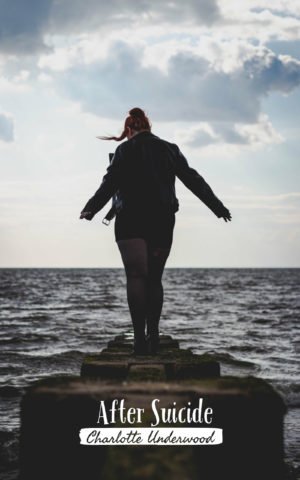
Charlotte, welcome to my blog Kelly Martin Speaks, so what inspired you to become a mental health advocate, writer, and blogger?
I lost my father to suicide in 2014, at the age of 18, it was a hard experience and the first time I really realized how serious mental illness was. At this point, I had already suffered from depression and anxiety and had tried to take my own life but because I didn’t care much for myself, It didn’t feel so serious because it was contained in my head.
Seeing someone I love suffer really put it in perspective and I decided that I wanted to help prevent anyone from feeling the way I did, the way my dad did and I did not ever want anyone to feel like they were alone. I can’t help everyone, I know that, but saving one life is also saving their family, it’s saving a community and showing people that love does exist and they deserve support.
When writing about mental health does it become a healing process for you and why is it important?
Writing has become my main form of therapy. Through most of my life, I have struggled to talk about my emotions and even express my needs. I always just sort of accepted things as they were, and that is incredibly toxic if the said things are having a negative reaction towards your mental health.
Writing allowed me to rip out those bad thoughts, shove them on paper and from there I could organize and understand them – it’s a bit like draining venom from a snake bite I suppose. It’s so important because it has taught me that these thoughts don’t have to live in my head and they don’t have to be ignored.

For anyone reading who has mental health issues, would you have any suggestions to help them get into their own healing journey through writing?
I’d like to say firstly that writing isn’t the only option,it works well for me and for many others, but some people don’t take to it, which is ok. You can try other things like painting, running, singing or just standing in the sun for a few moments in the morning. But if you do want to write, I suggest just writing a little bit each day. It can be a diary entry, a paragraph of your future book, a blog post, a poem – literally anything that is festering in your mind. Don’t set yourself rules, let it flow from inside and don’t fuss about how it looks.
Writing is and always has been an expression, it’s not a chore – it’s an outlet and should be fun, so don’t pressure yourself.
What is the most important life lesson you have learned so far from the challenge’s that life has brought your way?
You cannot please everyone. By nature, I am kind, quiet and navigate life through my own lens, it proved positive with my loved ones. As a teen, I found that people didn’t like me because of these qualities, so I changed – I learned how to be mean, how to be selfish in the worst way, and while it made me new friends, I also made many new people turn against me.
Now, I have gone back to my routes but have kept an element of selfishness, in the sense of putting myself first but I try never to be unkind – and people still hate me. You can’t win all the time but that isn’t a reflection on who you are.

Would you consider yourself an introvert, ambivert or extrovert by nature and how has this helped or proved challenging in your role as a writer and mental health advocate or simply as a human being?
I am a textbook introvert. I love my own space, I like to be alone and I thrive in a quiet and human-free environment. It means that I am less influenced and stronger in understand what I both want and don’t want, so it’s helped to clarify that writing is important to me and moreso that partying every weekend, as I used too, for fear of being rejected otherwise.
Though, trying to talk to people about mental health and advocate for it can prove challenging when you feel like saying “Hi” to a stranger is just as scary as meeting the Queen of England.
How does social media help you with your own mental health journey?
Social media has given me a gateway to talking about mental health, it gives me an outlet and has also gifted me many new friends who have a genuine passion for helping others and who can understand what I have been through – as an introvert, this is not something I really have in the ‘real world’.
If you could have any skill or gift in life, that you think you may not have, what would it be and why?
I wish that I could let go of the hatred and the trolls. A skill to be immune to the ‘haters’ let’s say. Because I talk so publicly about mental health, I do attract the wrong type of attention and it’s honestly heartbreaking. They’ll never win, I understand they are just projecting and it says more about them but I wish I wouldn’t obsess over pleasing everyone; I guess that’s two skills.
Is there a key message you would like to put out there to those who suffer from mental health issues?
You do not have to prove anything, you do not have to be anyone, all you need to be is yourself and try your best because that is and always has been enough.
I understand you are an author also, what is your book called and what is it about?
‘After Suicide’ is my own recognition and perspective of the events leading up to, during and after my father’s suicide. It tells you my story of recovery and the effect the grief and suicide loss can have. I released it in hope that a person going through a similar situation could feel less alone, because I know I felt so lonely during the years after my father’s death.
Where can people find your book to buy?
MyE-book ‘After-Suicide’ is free and can be found here where it can be downloaded to almost all devices in many formats.
Any plans for future books?
I would like to release a book on a more detailed look into my mental health journey, though, because my story is so unstructured, finding the right writing style and content could take some time!
Where can people find you on social media?
You can keep up to date with me daily on Twitter @CUnderwoodUK or visit me on my blog charlotteunderwoodauthor.com where I upload every Sunday about topics around mental health.
Thank you Charlotte for helping us get to know you better!

